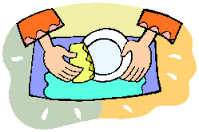Let’s be honest: we all want to save the planet, we just don’t want to be inconvenienced by it.
And then… I had a child. And now I am realising we are wrecking the place that they need to grow old on, and that is not a debt they should inherit from us.

The time is rapidly approaching where we will hit the point of no return, and then it will be a case of too little too late. Humans are damaging the very eco-system we depend upon to support us, and it is imperative that we do as much as we can immediately to halt this process. Luckily, there are loads of really easy ways that you can make a positive impact without having to subject yourself to local transport (which we SHOULD do, but in SA… er, no). In fact, they are quite fun!
Eat vegetables and locally-sourced meat
(Pic: Bryanston Organic Market)
Industrial farming practices are not only harmful to individual animals, they're unsafe for the planet itself. Factory farming produces a lot of air and water pollution, and with the rise of organic markets there is no excuse: they are cheaper, healthier, and better for the planet! Plus supporting local is lekker. You can address this issue in a personal way by doing the following:
- Eat more vegetables. This simple change is a way of opting out of the factory farming industry.
- Question where your meat comes from and buy only locally-sourced meat from a small farm.
- Avoid eating beef. Cows emit lots of methane, a dangerous greenhouse gas, and other pollutants. Try to reduce your beef intake and opt for other types of meat.
- Eat sustainably-caught fish. The oceans are being depleted of large fish populations due to overfishing and pollution. Up to 90 percent of the ocean's large fish are now gone. Eat only fish that is in season and caught using sustainable practices.
- Not sure which fish is fine? Add the number 079 499 8795 to your cellphone contacts and simply text the name of a fish to this number to receive an immediate message telling you whether to tuck in, think twice or avoid completely.
Produce less waste
Everything you throw in the garbage, tie up and take out to be collected is going to end up in a landfill. Plus, all that trash - plastic, paper, metal, and whatnot - was likely manufactured using unsustainable practices that hurt the health of the earth's land. By making less trash, you can reduce your impact. Try making these changes:
- Buy products that you can reuse. Get glass containers instead of flimsy plastic ones, for example.
- Don't use plastic bags, buy cloth and keep them in your car to reuse every shopping trip.
- Avoid products with several layers of packaging when only one is sufficient. About 33% of what we throw away is packaging.
- Use reusable plates and utensils instead of disposable ones, and use reusable containers to store food instead of aluminum foil and cling wrap. DON’T DRINK BOTTLED WATER! Go glass!
- And don’t use straws, they are the biggest source of litter in our oceans.
- Buy rechargeable batteries for devices used frequently, and when you DO have to chuck old batteries (like your car’s!) dispose of it properly.
- Use email or texting as a substitute for paper correspondence and save the trees, man!
- ...if you MUST use paper, go recycled, and print on both sides.
Recycle
But some things we cannot cut out of our lifestyle, so what you cannot avoid you should recycle. You can help reduce pollution just by putting that Coke can in a different bin! If an office building of 7,000 workers recycled all of its office paper waste for a year, it would be the equivalent of taking almost 400 cars off the road. There are many local municipality recycling initiatives, like the Ronnie Bag, which will take all your recycling and sort it for you, but if you live in a complex consider hiring a recycling company (like www.ecomonkey.co.za) OR sort your own recycling and drop off at a school or shopping centre near you. The good karma will come back to you!
Conserve water
Cape Town should be a warning to us in other parts of the country. Wasting water is one of the biggest ways individuals impact the health of the planet, and taking measures to use less water is something you can start doing right away. If you live in an area with a water shortage, this is even more important for the health of your region's environment. Try to check off as many items as possible from this list:
- Check and fix any water leaks. A leaky tap or toilet can waste a lot of water.
- Install water-saving devices, like a low-flow showerhead to start.
- Don't wash dishes with the water running continuously. Use a method that requires less water to get the dishes clean.
- Turn off the washing machine's water supply to prevent leaks. It doesn't need to be on all the time.
- Replace old toilets with new ones that use a lot less water.
- Wash and dry only full loads of laundry and dishes. Doing a half-load wastes water.
- Don't use too much water to water your lawn - consider installing a tank to catch gutter run-off during the rainy season and use that, OR create a water-wise garden.
- Don't leave the tap running while you brush your teeth.
Compost
Think about how much trash you make in a year. Reducing the amount of solid waste you produce in a year means taking up less space in landfills, so your tax bucks can work somewhere else (NOT Nkandla). Compost makes a great natural fertiliser so you can make that veggie or herb garden that you’ve always wanted, or just keep your lawns and flowerbeds healthy. Composting is easier than you think, and you can get your complex or neighbours involved too to make management take less time and make more fun!
Besides all the amazing benefits that the planet will reap from our proactive passion, there is one thing that we don’t count on: that warm, fuzzy, altruistic glow in our conscience of doing good, and the good karma that will come with it. Make some changes today, and let’s see the benefits in the years to come.




